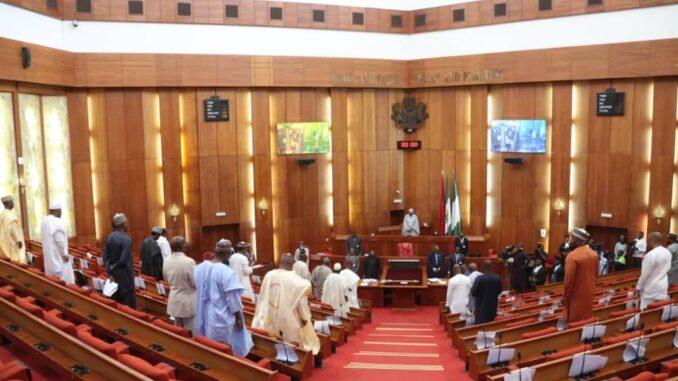
Nigerians grope today into the 22nd anniversary of the 4th Republic democratic rule wondering whether the hype about civil rule is worth it, no thanks to betrayal of their hope for a life more abundant than what they had in the military years.
Nigerians paid a heavy price for liberation from military oligarchy. Very sadly, the reward they are getting is misery, poverty and fear. These have been heightened in the last six years that President Muhammadu Buhari has been in the saddle. And no respite is in sight.
Much against the norm, there can be no fanfare to mark the auspicious moment which, in substance, shall be commemorated in sombre mood and regrets of aspirations dashed by the political class. The state has failed to translate democracy to values of general wellbeing and indeed the common good. Yet, the beleaguered Nigerian masses deserve better bargains from the faltering political elite and the lack-lustre Buhari administration.
After 30 years of military dictatorship, many Nigerians expected a better deal under a civil rule arrangement. So, the eventual return to democratic system of governance on May 29, 1999, was as remarkable as the Independence Day celebration was in 1960. But if post-independence events were disappointing, May 29 Democracy Day is a bigger letdown.
That the country is bleeding on all arteries is an understatement. In a country of 200 million people, it is a big deal that one of every three is either unemployed or underemployed. Inflation is at its all-time high of 18 per cent, with prices of foodstuff now more than double in less than six years. That is not unexpected where the pump price of petrol, the oxygen of transport and power supply, stands at N162 and threatens to climb to N385/litre in a fully deregulated setting.
Liquidity crisis and attendant exchange rate of N486/$1 also make all imports very expensive, and hobbled the manufacturing sector. Worse is that corruption and thieving are allowed to thrive. In consequence, Insecurity ravages the entire country in some alarming proportion.
The problem is more fundamental than the optics will show. The military handed over in 1999 with a faulty ‘federal’ Constitution that deposits full control at the centre and almost nothing to other levels of government. With the presidency in firm control of both resources, security and obnoxious monthly sharing of allocations to States and Local councils, it is near impossible to hold the State governors and council representatives accountable for gross failings and sheer irresponsibility to the grassroots. This is at the crux of the current clamour for restructuring and true federalism that this newspaper has been harping on for the past 31 weeks.
What is worse, the political class could not just be bothered even if the country falls apart along its fault lines. The legislative arm that feeds fat on the country’s commonwealth lacks empathy for the plight of the people, or enough commitment to demand better governance from the executive. The hallowed chambers of the legislature have strangely become a convalescent home for former governors to lounge, and it turns a blind-eye to ethnic cleansing, religious bigotry, blatant ethnic chauvinism, and nepotism in presidential appointments – all pointers to some hidden agenda. It tells of how badly politicians have mismanaged the country: there should be a Hall of Shame erected for them.
But the country need not be engulfed in full-blown anarchy or disintegration – if the political class would sense enough danger and pull it back from the brink. It begins with self-realisation of failed leadership in the last 22 years and countervailing moves to shift focus of statecraft to work for the survival of the country. This is to assert that politicians should change their course and make democracy work for Nigeria, beginning with the understanding of what it entails. The ultimate goal of statecraft is the people and their wellbeing. Hence, democracy aims to elect true representatives of the electorate to serve as trustees of people’s wellbeing and happiness. But this can only be achieved through a free and fair election. Modern democracies are known to guarantee fundamental rights, transparency, trust, prosperity, human capacity development and fulfillment.
But there is one thing needful at this juncture: the country should be restructured to give more powers to the federating units to control their resources, chart their economic prosperity, manage their security and be accordingly held accountable. The onus is on the president, especially, to disabuse the minds of the vastly divided Nigerians that he is not an ethnic bigot, and he is still committed to the common good and indeed a better Nigeria as promised on May 29, 2015.
However, governance is too important to be left to politicians alone. It is for that flow of modern democracy that citizens’ participation is most essential to good democracy. Every Nigerian should be involved in government, as direct participants or active observers. Rather than just complain, it is our civic obligation to stop the barbarism that government has become.
Reason: mere lamentation has never been a strategy. There should be citizen action – to monitor governance and hold the state actors to account as the constitution provides.
And so in the main, the people should hold their representatives accountable and demand better leadership across all levels – instead of passing complaints to God as we often do here. Nigerians should name and shame hard-boiled criminals masquerading as politicians, mismanaging the people and steadily running the country aground. That is the only way that the country can avoid commemorating another Democracy Day as a national funeral.
END

Be the first to comment